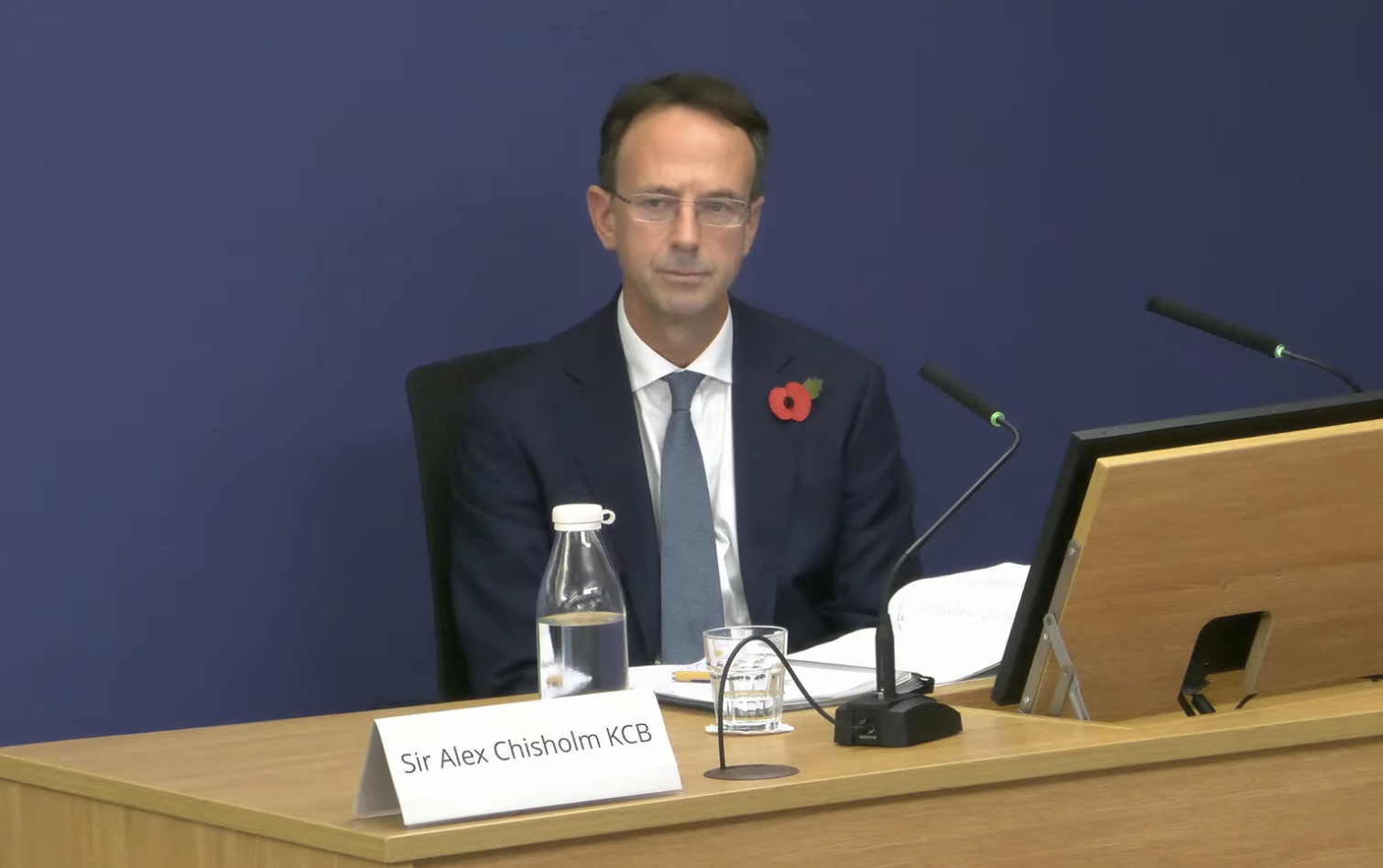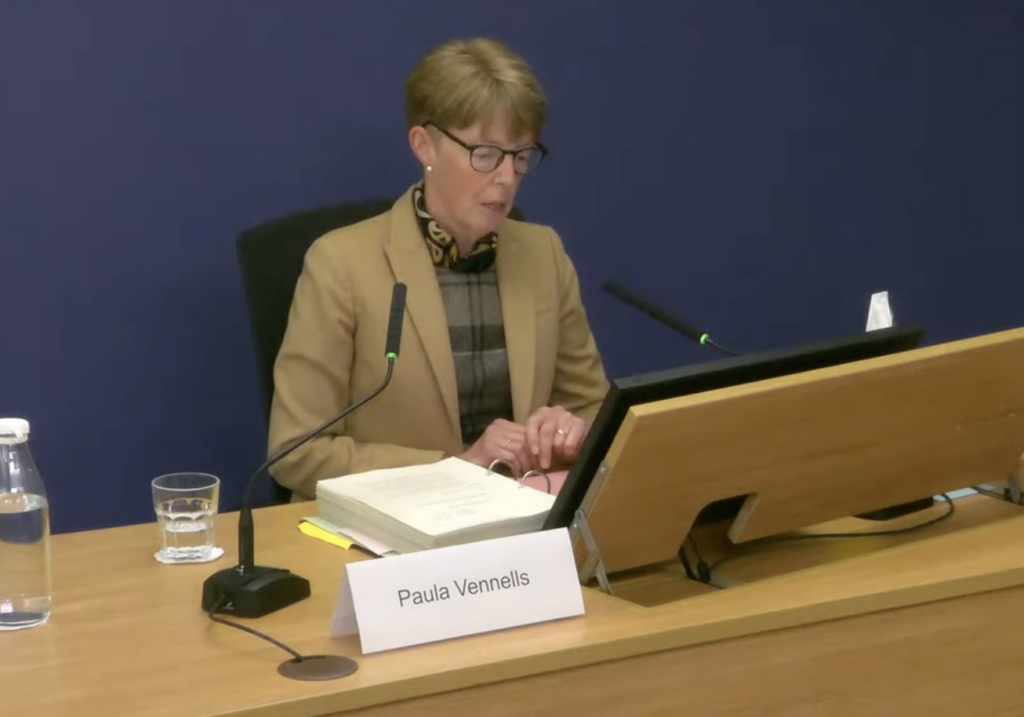
Sir Alex Chisholm KCB was one of the most powerful government civil servants during a crucial phase of the Post Office scandal, and to nerds like me, his evidence was always going to be of some interest.
Chisholm made it quite clear (watch it here) he was crawling all over the Post Office’s disastrous defence to the Bates v Post Office group litigation, but that every duff decision was its to make alone.
“I was very clear in my advice to the Secretary of State”, Chisholm told the Inquiry, “that the department need to be a neutral party in relation to litigation so we could respond and deal with the fallout and the consequences of remediation.”
Chisholm joined the Business department (then known as BEIS) in September by 2016. In Chisholm’s words, by that stage the “prosecutions of subpostmasters had ceased… 33 cases had already been referred to the Criminal Cases Review Commission, and the civil litigation that definitively exposed the multiple failings within POL had already begun.”
Chisholm evidently knew something was up. But it seems he was content to watch a government-owned company drive itself over a cliff, in order to avoid being implicated in the disaster. Allowing the directors of an organisation to tank a billion pound business because you want to be there to clear up the mess smacks of negligence.
Avoiding reality
Chisholm spent much of his evidence setting out the extent of what might be called his implausible deniability. He was fully aware of the Justice For Subpostmasters Alliance campaign, the media reports, the MPs’ concerns, the Criminal Cases Review Commission’s investigation and the looming litigation. He also told the Inquiry that he smelt a rat when he looked at the information coming from the Post Office. “The Post Office had maintained for years that there were no problems with Horizon”, he told the Inquiry “and they used… these stock phrases… to say there was no evidence of system-wide problems with the Horizon software.”
By 2018, the Post Office’s “stock phrases” of reassurance began to irk Chisholm. They “kept appearing in the briefings and I began to think that they were, you know, designed not to kind of really invite one in and to show the full reality.”
In May of that year, he demanded more information from the Post Office, who were reluctant to hand it over, claiming legal privilege, an almighty red flag for a shareholder.
Chisholm was so concerned that in October 2018 he convened a meeting with the Post Office General Counsel, Jane MacLeod (who has refused to be questioned by the Inquiry) to try to find out what was going on with the litigation. During the meeting, Chisholm said he told the Post Office “You’re in a hole, you’re still digging”. He told the Inquiry “I’m asking even at that time, ‘shouldn’t you be settling?’”
Helping Vennells fail upwards

Chisholm knew all in the Post Office garden was far from rosy, which makes it hard to square his actions when it came to rubber-stamping the Post Office CEO Paula Vennells’ CBE.
Although he was not asked about it during his evidence, Chisholm explains his involvement in the process in his witness statement. Six days after Chisholm’s October 2018 meeting with the Post Office, the BEIS Honours Secretariat told officials at UK Government Investments (UKGI) that Vennells had been nominated for a CBE. In response, UKGI highlighted the ongoing litigation but said they thought it “shouldn’t stop Paula’s nomination”. The issue went to Chisholm for his opinion.
“Through my private secretary”, he writes, “I said that I was ‘content for the information in (UKGI’s) email below to be passed to the Cabinet Office’. I made the point that ‘the litigation relates to Post Office Limited contracts and systems going back to 1999 and that Paula Vennells has been CEO since 2011’. I accepted and agreed with the UKGI view that the nomination could proceed. My view, in October 2018, was that there were at that time insufficient reasons to withdraw the nomination. I understand that I was one of a number of people who confirmed the same. At that time, we were not aware of the deficiencies which came to light in the March 2019 Judgment, and subsequently.”
Throughout the cover-up period of the scandal (2013 to 2019), Post Office execs dissembled to a credulous board. Through them, incomplete information was fed via UKGI and directly to Chisholm and the BEIS ministers. Chisholm was onto this, and indicated the Post Office was heading towards legal disaster, yet he still saw these problems as “insufficient reasons” to oppose Vennells’ nomination. As Chief Executive, Vennells was directly responsible for pointing the Post Office ship towards oncoming iceberg and charging to meet it.
A clue as to how much Chisholm cared about the scandal, Subpostmasters and the fate of the Post Office might come from a private note (which surfaced during Greg Clark’s evidence) written in 2019 by the acting CEO of the Post Office, Al Cameron, to his successor Nick Read. Cameron writes: “Alex doesn’t want us to do anything that might damage his career prospects”.
Seen through that lens, a lot of things make sense.
The journalism on this blog is crowdfunded. If you would like to join the “secret email” newsletter, please consider making a one-off donation. The money is used to keep the contents of this website free. You will receive irregular, but informative email updates about the Post Office Horizon IT scandal.

Leave a Reply